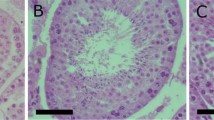Abstract
Purpose
To evaluate the effect of long-term caffeine administration to mice on in vitro fertilization (IVF) of oocytes.
Methods
Mice were injected with different dosages (0, 0.1, and 1.0 mg/mouse/converted day) of caffeine for one month. Subsequently, the fertilization rate and embryo development to blastocyst stage were evaluated in IVF using oocytes from the mice.
Results
The retrieved average oocyte rate was significantly lower (27.4) in mice injected with 1.0 mg caffeine than in the control group (36.5; P < 0.05); the fertilization rate was significantly different between the 0 mg (317/401; 79.1 %) and 1.0 mg group (199/301; 66.1 %) (P < 0.05). At 96 h after insemination, the blastocyst formation rate was significantly decreased in the 1.0 mg group (94/199; 47.2 %) compared with the control (0 mg) group (237/317; 74.8 %) and 0.1 mg group (226/323; 70 %) (P < 0.05). When 1.0 mg caffeine was administered for two weeks, embryo development was significantly impacted.
Conclusions
Our findings suggest that caffeine administration negatively impacts oocytogenesis and embryonic development after IVF.
Similar content being viewed by others
References
Caffeine. In Wikipedia. Retrieved March 26, 2013, from http://en.wikipedia.org/wiki/Caffeine.
Ramlau-Hansen CH, Thulstrup AM, Bonde JP, Olsen J, Bech BH. Semen quality according to prenatal coffee and present caffeine exposure: two decades of follow-up of a pregnancy cohort. Hum Reprod. 2008;23:2799–805.
Shimazu T, Inoue M, Sasazuki S, Iwasaki M, Kurahashi N, Yamaji T, Tsugane S. JPHC study group members of the Japan public health center-based prospective study. Int J Cancer. 2008;123:2406–10.
Je Youjin, Lin Wei, Giovannucci E. Coffee consumption and risk of colorectal cancer: a systematic review and meta-analysis of prospective cohort studies. Int J Cancer. 2008;124:1662–8.
Weng X, Odouli R, Li DK. Maternal caffeine consumption during pregnancy and the risk of miscarriage: a prospective cohort study. Am J Obstet Gynecol. 2008;198:279 e1–8.
Bech BH, Nohr EA, Vaeth M, Henriksen TB, Olsen J. Coffee and fetal death: a cohort study with prospective data. Am J Epidemiol. 2005;162:983–90.
Cnattinggius S, Signorello LB, Anneren G, et al. Caffeine intake and the risk of first-trimester spontaneous abortion. N Engl J Med. 2000;343:1839–45.
Parazzini F, Chatenoud L, Di Cintio E, et al. Coffee consumption and risk of hospitalized miscarriage before 12 weeks of gestation. Hum Reprod. 1998;13:2286–91.
Signorello LB, McLaughin JK. Maternal caffeine consumption and spontaneous abortion; a review of the epidemiologic evidence. Epidemiology. 2004;15:229–39.
Wisborg K, Kesmodel U, Bech BH, Hedegaard M, Henriksen TB. Maternal consumption of coffee during pregnancy and stillbirth and infant death in first year of life: prospective study. BMJ. 2003;326:420.
Grosso LM, Bracken MB. Caffeine metabolism, genetics, and perinatal outcomes: a review of exposure assessment considerations during pregnancy. Ann Epidemiol. 2003;15:460–6.
Purves D, Sullivan FM. Reproductive effects caffeine: experimental studies in animals. In: Garattini S, editor. Caffeine, coffee, and health. New York: Raven; 1993. p. 97–150.
Nagasawa H, Sakurai N. Effects of chronic ingestion of caffeine on mammary growth and reproduction in mice. Life Sci. 1986;39:351–7.
Daly JW. Mechanism of action of caffeine. In: Garattini S, editor. Caffeine, coffee, and health. New York: Raven; 1993. p. 97–150.
Wang Y, Lau CE. Caffeine has similar pharmacokinetics and behavioral effects via the IP and PO routes of administration. Pharmacol Biochem Behav. 1998;60:271–8.
Schreiner CM, Zimmerman EF, Wee EL, Scott WJ Jr. Caffeine effects on cyclic AMP levels in the mouse embryonic limb and palate in vitro. Teratology. 1986;34:21–7.
Pollard I, Murray JF, Hiller R, Scaramuzzi RJ, Wilson CA. Effects of preconceptual caffeine exposure on pregnancy and progeny viability. J Matern Fetal Med. 1999;8:220–4.
Christian MS, Brent RL. Teratogen update: evaluation of the reproductive and developmental risks of caffeine. Teratology. 2001;64:51–78.
Pomeroy KO, Dodds JF, Seidel GE Jr. Caffeine promotes in vitro fertilization of mouse ova within 15 minutes. J Exp Zool. 1988;248:207–12.
Nash JE, Persaud TVN. Influence of nicotion and caffeine on rat embryonic development. Histol Histopath. 1988;3:377–88.
Huang Z-L, Qu W-M, Eguchi N, Chen J-F, Schwarzschild MA, Fredholm BB, Urade Y, Hayaishi O. Adenosine A2A, but not A1, receptors mediate the arousal effect of caffeine. Nat Neurosci. 2005;8:858–9.
Kotsuji F. Folicular development and maturation and theca cell. In: Mori T, editor. Oocytology. Kyoto: Kyoto University Press; 2011. p. 359–69.
Yokota Y, Yokota M, Yokota H, Ishikawa Y, Sato S, Araki Y. Relationship between follicular fluid hormone levels, embryo quality, and maternal age during in vitro fertilization after the short or long protocol with a gonadotropin releasing hormone agonist. Reprod Med Bio. 2003;2:165–9.
Nagata C, Kabuto M, Shimizu H. Association of coffee, green tea, and caffeine intakes with serum concentration of estradiol and sex hormone-binding globulin in premenopausal Japanese women. Nutr Cancer. 1998;30:21–4.
Ferrini RL, Barrett-Connor E. Caffeine intake and endogenous sex steroid levels in postmenopausal women. Am J Epidemiol. 1996;144:642–4.
Wilcox A, Weinberg L, Baird D. Caffeinated beverages and decreased fertility. Lancet. 1988;2:1453–6.
Bolumar F, Olsen J, Rebagliato M, et al. The European study group on infertility and subfecundity. Caffeine intake and delayed conception: a European multicenter study on infertility and subfecundity. Am J Epidemiol. 1997;145:324–34.
Curtis KM, Savitz DA, Arbuckle TE. Effects of cigarette smoking, caffeine consumption, and alcohol intake on fecundability. Am J Epidemiol. 1997;146:32–41.
Tolstrup JS, Kjaer SK, Munk C, Madsen LB, Ottesen B, Bergholt T, et al. Does caffeine and alcohol intake before pregnancy predict the occurrence of spontaneous abortion? Hum Reprod. 2003;18:2704–10.
Cynthia KS, Ronald HG. Effects of caffeine consumption on delayed conception. Am J Epidemiol. 1995;142:1322–9.
Al-Saleh I, EI-Doush I, Grisellhi B, Coskun S. The effect of caffeine consumption on the success rate of pregnancy as well various performance parameters of in vitro fertilization treatment. Med Sci Monit. 2010;16:CR598–605.
Conflict of interest
We have no conflict of interest.
Author information
Authors and Affiliations
Corresponding author
About this article
Cite this article
Yokota, H., Yokota, Y., Yokota, M. et al. Effect of long-term caffeine administration to mice on in vitro fertilization and embryo development using oocytes. Reprod Med Biol 12, 167–171 (2013). https://doi.org/10.1007/s12522-013-0150-4
Received:
Accepted:
Published:
Issue Date:
DOI: https://doi.org/10.1007/s12522-013-0150-4




